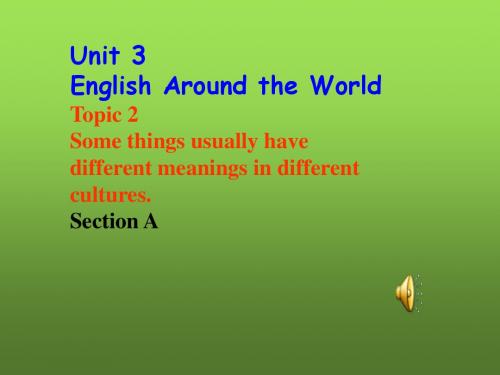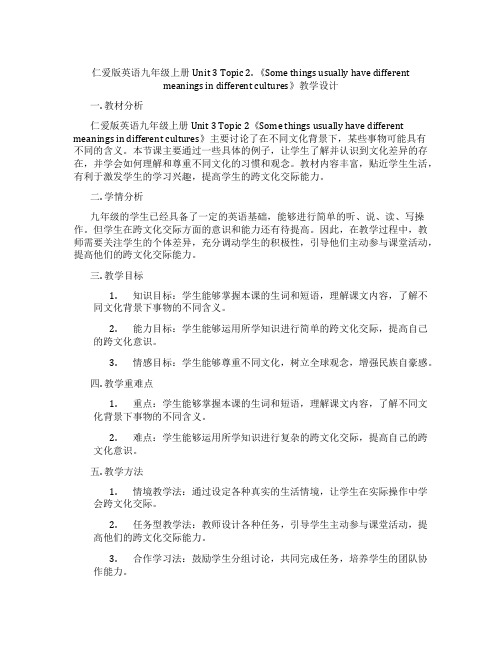仁爱版九年级上册英语Uint3Topic2(江门九中)
仁爱版英语九年级上册Unit 3 Topic 2《Some things usually have

仁爱版英语九年级上册Unit 3 Topic 2《Some things usually have differentmeanings in》SectionB 教学设计一. 教材分析本课选自仁爱版英语九年级上册Unit 3 Topic 2《Some things usually have different meanings in different cultures》Section B。
本节课主要讨论了在不同文化中,一些事物可能具有不同的含义。
通过对比中西方文化中的一些事物,让学生了解并认识到文化差异,学会尊重和理解不同文化背景下的价值观和行为方式。
教材内容丰富,贴近学生生活实际,有利于激发学生的学习兴趣和积极性。
二. 学情分析九年级的学生已经具备了一定的英语基础,能够听懂并运用基本的日常用语进行交流。
但是,对于一些抽象的概念和深层次的文化差异,学生可能还较为陌生。
因此,在教学过程中,教师需要善于引导,让学生通过观察、思考、讨论等方式,逐步理解和掌握所学内容。
三. 教学目标1.知识目标:让学生掌握表示文化差异的词汇和表达方式,如traditional, festival, custom等;能听懂、说出一件事情在不同文化中的不同含义。
2.能力目标:培养学生运用英语进行交流和讨论的能力,提高学生的跨文化交际意识。
3.情感目标:使学生认识到文化差异的存在,学会尊重和理解不同文化背景下的价值观和行为方式。
四. 教学重难点1.重点:让学生能够运用所学的词汇和表达方式,谈论文化差异。
2.难点:让学生理解并能够表达一件事情在不同文化中的不同含义。
五. 教学方法1.任务型教学法:通过设定各种真实的任务,让学生在完成任务的过程中,自然地学习和运用所学知识。
2.情境教学法:创设各种文化背景下的情境,让学生在具体的情境中,感受和理解文化差异。
3.交际教学法:鼓励学生积极参与课堂交流,提高学生的跨文化交际能力。
六. 教学准备1.准备相关文化背景的图片、视频等教学素材。
Unit 3 Topic2 SectionD教案 仁爱版九年级英语上册

九年级上册Unit 3 Topic 2 Some things usually have different meanings in different cultures.Section D【教学构思】一、教材分析:本课属于课标话题人与社会——“语言学习(Language learning)”中语言与文化(Language and culture)项目,主要介绍英语的发展和变化。
主要教学活动为1a和Project,学生通过阅读了解英语的发展和变化,获取主要信息,了解英语的变化,进一步提高阅读能力。
Project中通过阅读王俊峰的邮件了解他存在的困难,小组讨论找出解决措施,并帮助Michael回信。
Section D第一个部分的内容,总结本话题所学语法和功能,在复习时发现学生存在的问题,及时解决问题。
二、设计说明:根据学情和本课的语法及话题,本节课的教学设计将说、读、写相结合,先复习本话题所学语法和功能,补缺补漏,融会贯通。
通过阅读1了解英语的发展和变化,获取主要信息。
小组讨论王俊峰的困难和解决措施,积累语料,帮助Michael回信,培养学生“写”的语言能力。
本课在重、难点突破的方法上有所创新,教师通过竞赛方式复习本话题所学语言语法知识,既能引导学生有效复习,又能激发学生积极性和主动性。
阅读王俊峰邮件后小组讨论积累语料,学习书信的格式,帮助Michael回信。
【教学目标】1. 复习本话题语法和功能,能够正确使用所学语法和功能,培养综合语言能力;2. 能根据上下文含义、转折词等理解段落中各句子之间的逻辑关系,培养“读”的语言能力;3. 通过小组活动,学会分析问题和解决问题,发展思维品质;4. 小组讨论后帮助Michael回信,学习书信格式,培养“写”的语言能力。
【教学重难点】1. 正确使用现在进行时表将来;2. 帮助Michael回信,掌握书信格式。
【教学方法】任务型教学法【教具】多媒体设备,教学课件【教学过程】Step 1. GreetingStep 2. Review1. Review the words and phrases in this topic by playing games.2. Review the grammar in this topic by doing some exercises and fill in the blanks of Grammar and Functions. Students can do the exercises through competition to see which group can complete the exercises fastest and most correctly.(设计意图:通过希沃设计竞赛和游戏方式,复习本话题语法和功能,既能帮助学生梳理记忆本课重点知识,及时补缺补漏,又能激发学生兴趣和积极性。
仁爱版英语九年级上册9A_Unit3_Topic2_SectionD_教学设计

Unit3 Topic2 SectionD 教学设计Ⅰ.Material analysis本课是九年级第三单元第二话题的第四课时,要完成Section C 的3和Section D。
主活动是1a 和Project。
1 a 是个任务型阅读,需要学生通过联系上下文,填入所缺的句子。
学生在完成这个任务的同时也了解了英式英语和美式英语的差异。
1b 是个辅助步骤,意在检测学生的理解能力。
Grammar 和Functions 是要求学生总结本话题的语法和重点句子。
最后设置的Project 其实是个综合型任务。
学生要解决Wang Junfeng 的困难,必须要对整个话题的内容进行整合,即:英式美式英语的差异,肢体语言的差异。
通过学习本课,学生会了解到英语在不同的英语国家也是有差异的,英语也会随着时间、地域的变化而变化,从而为英语学习可能面临的困难做好心理准备。
因为有了这个心理准备,所以在学习英语的过程中,如果遇到困难就不会轻易放弃。
Ⅱ.Teaching aims1. Knowledge aims:掌握本课的重点词汇和短语,了解英式英语和美式英语的差异。
2. Skill aims:能正确理解英式英语和美式英语的差异。
在学习英语的过程中,如果遇到这种差异,也不会造成理解上的困难。
3. Emotional aims: (optional)知道学习英语不会一帆风顺,为战胜困难做好心理准备。
4. Culture awareness: (optional)知道英式英语和美式英语在哪些方面存在差异。
Ⅲ.The key points and difficult points1. Key points:Words and phrases: British, pronunciation, cent, expression, spelling, totally,borrow...from..., all the time, be different from, havedifficultyin doing sth.Sentences: How are you doing?Best wishes to you and your family.I can’t follow them.1Grammar: Showing the future by present continuous2. Difficult points:The English language is changing all the time.English-speaking / spoken EnglishⅣ.Learning strategies能通过完成1a ,学习利用上下文来找到缺失的句子。
Unit 3 Topic 2 Section C 课文讲解课件 仁爱版九年级英语上册

In Chinese culture
negative meanings
a homeless dog a mad dog a running dog a dog catching a mouse
译e文.g.:H有ere些is东yo西ur在ti不cke同t.文化中有不同的含义。这里有一些 关于动物的词语,在中国文化和西方文化中用法不同。
Most phrases in Chinese about the dog, such as "a homeless dog", "a mad dog", "a running dog" and "a dog catching a mouse", have negative meanings. But in western countries, dogs are considered honest and good friends of humans. The word, "dog", has positive meanings. For example, "you are a lucky dog" means you are a lucky person. And "every dog has its day" means each person has good luck at times. 译文:中国多数关于狗的短语,比如“丧家之犬”、“一条疯狗”、“走狗”和“狗 逮耗子”,都是贬义词。但是在西方文化中,狗是人类忠实的好朋友。“dog” 这个单词有积极地含义。比如,“you are a lucky dog”的意思是你是一个幸运 儿。“every dog has its day”的意思是每个人都有得意的时候。
仁爱版九年级上册英语第三单元Topic2课件

PPT
小学教学课件
PPT
Unit 3 English Around the World
Topic 2 Some things usually have different
meanings in different cultures.
Section B
Michael sees a stranger putting out his
7. They are busyd_o_in_g_s_o_m_e__r_e_se_a_r_c_h_o_n(做关于……的研 究) how to improve the environment.
8. Miss Wang usually raises her thumbs to _p_ra_i_se___ (表扬) us.
Summary:
1. Some words: bow, silence, hip, praise, research, secret, puzzled, victoryphrases: a sign of, be known as, be known for, even if, do some research
_e__ Calm down.
_c__ I’m just kidding. _f__ Have a victory.
What does the body language mean?
Showing agreement?
Showing disagreement?
3 Put these sentences in the correct order to form a passage.
( C ) 1. Yang Liwei, the national hero is known ____ all
仁爱版九年级英语上册 Unit 3 Topic 2 Section A 课件(共20张PPT)

y uncle ______ to see me. He’ll be here soon.
My mother ______ for London tonight. A. leaves B. is leaபைடு நூலகம்ing C. left A. do you start B. will you starting C. are you starting
1
用括号所给动词的适当形式填空
am moving ( move) to Shanghai next month. A. I ______________
are starting (start) at 8:00 a.m. tomorrow. B. They _____________ are traveling C. We _________________ (travel) to Beijing next Sunday.
are leaving in an hour.
4. The summer holidays are coming soon.
开始:__________________ start, begin 位移动词
go, leave, arrive, take off,return 来去come, :__________________
When ______ ? - In ten minutes.
go to the central park, this weekend
__________________________________________
I am going to the central park this weekend.
Unit 3 English Around the World
仁爱版英语九年级上册unit3topic2microsoftword文档

Unit3 Topic2 词汇课文基础过关测试姓名: ________________学号__________ 得分:__________一、英汉互译(单词)(20× 1)1 flight2 诚实的,坦率的3 negative4 勇气,胆略5 magical6 研究,调查7 wisdom 8 错误,失误9 expression 10 陌生人11 totally 12 古代的,古老的13 puzzled 14 胜利15 positive 16 骄傲,自豪17 underline 18 发音19 elevator 20 无论何时二、英汉互译(短语)(20× 1)1 做关于...的调查2 at times3 为.......感到骄傲4 make mistakes5 把......比作...6 worry about7 把......相比8 on one’s way to9 为某人送行10 a homeless day11 上车12 pay attention to13 搭乘,打车14 be regarded as15 让某人搭便车16 take pride in17 伸出18 have a victory19 是......还是...... 20 consider......as/ to be三、根据要求填空。
(30× 1)四、单词词性中文意思词性单词中文意思1 Britain n adj2 Germany adj n3 differently adv n4 slince n adj5 stranger n adj动词原形(do)中文意思过去式(did)过去分词(done)现在分词(doing)6 praise praised praising7 make 制作8 give 给9 compare10 get 得到五、根据课文内容填空。
(20× 1)1. Some things usually have ________________ ________________ in different cultures.2. You are a lucky dog ________________ you are a lucky person.3. The ancient emperors ________________themselves ________________ dragons.4. The rose also ________________ ________________ peace, ________________and friendship.5. We bow when we saying hello ________________ ________________________________ ________________ respect.6. ________________ ________________ is your flight? ——At 5 O’clock.7. Some things have ________________ meanings in C ________________ cultureand W ________________ cultures.8. I wonder ________________ b ________________ l ________________means the same thing in all cultures.六、翻译句子。
仁爱版英语九年级上册Unit 3 Topic 2. 《Some things usually hav

仁爱版英语九年级上册Unit 3 Topic 2. 《Some things usually have differentmeanings in different cultures》教学设计一. 教材分析仁爱版英语九年级上册Unit 3 Topic 2《Some things usually have different meanings in different cultures》主要讨论了在不同文化背景下,某些事物可能具有不同的含义。
本节课主要通过一些具体的例子,让学生了解并认识到文化差异的存在,并学会如何理解和尊重不同文化的习惯和观念。
教材内容丰富,贴近学生生活,有利于激发学生的学习兴趣,提高学生的跨文化交际能力。
二. 学情分析九年级的学生已经具备了一定的英语基础,能够进行简单的听、说、读、写操作。
但学生在跨文化交际方面的意识和能力还有待提高。
因此,在教学过程中,教师需要关注学生的个体差异,充分调动学生的积极性,引导他们主动参与课堂活动,提高他们的跨文化交际能力。
三. 教学目标1.知识目标:学生能够掌握本课的生词和短语,理解课文内容,了解不同文化背景下事物的不同含义。
2.能力目标:学生能够运用所学知识进行简单的跨文化交际,提高自己的跨文化意识。
3.情感目标:学生能够尊重不同文化,树立全球观念,增强民族自豪感。
四. 教学重难点1.重点:学生能够掌握本课的生词和短语,理解课文内容,了解不同文化背景下事物的不同含义。
2.难点:学生能够运用所学知识进行复杂的跨文化交际,提高自己的跨文化意识。
五. 教学方法1.情境教学法:通过设定各种真实的生活情境,让学生在实际操作中学会跨文化交际。
2.任务型教学法:教师设计各种任务,引导学生主动参与课堂活动,提高他们的跨文化交际能力。
3.合作学习法:鼓励学生分组讨论,共同完成任务,培养学生的团队协作能力。
六. 教学准备1.教学课件:制作课件,展示课文内容、生词和短语。
- 1、下载文档前请自行甄别文档内容的完整性,平台不提供额外的编辑、内容补充、找答案等附加服务。
- 2、"仅部分预览"的文档,不可在线预览部分如存在完整性等问题,可反馈申请退款(可完整预览的文档不适用该条件!)。
- 3、如文档侵犯您的权益,请联系客服反馈,我们会尽快为您处理(人工客服工作时间:9:00-18:30)。
九年级上册英语导学案Unit 3 English Around the WorldTopic 2 English is spoken differently in different countries.Section A设计者:林安怡学校:江门九中审核人:蒋青一、自助学习(英汉互译)1.在校门口_______________________________ 3.给你打招呼问好_________________________ 5.代替…_________________________________ 7.和---一样_______________________________ 9. face to face___________________________2.众所周知______________________________ 4.一直___________________________________ 6.依赖,取决于_____________________________ 8.两者之间不同之处________________________ 10.和…有点儿不同________________________二、课堂导学A) 阅读1a,完成下面的分析与练习。
1. Sorry, I can’t follow you. Can you speak more slowly, please?译:________________________________________________________①follow在此处的意思是________________, 相当于_________或_______。
②follow还有“跟随”的意思,例如:Please follow me to go upstairs.③follow还可意为“遵循,遵从”,翻译:遵从医嘱________________2. I just said hello to you.译:________________________________________________________say hello to sb.---给某人打招呼拓展: 给某人道歉__________________给某人告别__________________给某人道谢_____________________3. Is Australian English the same as British English?译:______________________________________________be the same as 意思是_________________ 反义词组:__________________________翻译:你的尺子和我的一样。
________________________________________________4. By the way, I’m flying to Disneyland tomorrow.译:______________________________________________一些表示位移的动词: go, come, start, leave, fly, arrive, drive, travel, return等,常用现在进行时表将来练习: 1).你什么时候动身?When _______ you _________?2).我要走了。
I ______ _________.3).王叔叔要来吃晚饭。
Uncle Wang _____ _________ to have supper.5. If you want to succeed in making yourself understood, you need to know some of these differences.译:_________________________________________________________________________________ a. succeed in + 名词或动名词,意思是_________________________(名词)success成功;(动词)succeed成功;(形容词)successful成功的;b. make oneself + 过去分词: 使某人或某物被…练习:She couldn’t make herself heard because of the noise.译:__________________________________c. 动词need的用法●作为实义动词时,意思是“需要”,常用结构是:①need + 名词如:He needs some help.②need to do sth.需要做某事(人做主语) 如:I need to help him.③need doing sth.=need to be done(过去分词)某事需要做(物做主语)如:The room needs cleaning.=The room needs to be cleaned.●情态动词, 作情态动词时无__________________的变化,多用于________句中,后接动词______,否定形式是_____,意思是“不必”,它的一般疑问句的肯定答语用_____,否定答语用_____或_______。
d. difference ---不同(可数名词) 拓展:不同的_____________ 不同地______________常用词组:the differences between…and… ---…和…之间的不同之处be different from…---与…不同练习:你能说出他们之间的区别吗? Can you tell me _______ ____________ _________ them?三、堂上小测A、用所给词的正确形式填空:1. We should know the _________ (different) between British English and American English.2. The woman is too nervous to make her ___________ (understand).3. My teacher ____________ (fly) to Fujian next week.4. He succeeds in __________ (pass) the exam.5. English is spoken __________ (different) in different English-speaking countries.四、课后作业C、单项选择。
( )1. As we know, Australia is _________as well.A. an English-speakingB. an English-spokenC. a speaking-EnglishD. the English-spoken( )2. ---How about going to the Yellow Mountain this weekend?---It _________ interesting.A. soundsB. tastesC. smellsD. feels( )3. ---When _________you _________to Japan?--- Tomorrow morning.A. are; flyB. are; flyingC.are; to flyD. did; fly( )4. ---Jim, you speak so fast. I can’t _________you.--- Oh, sorry. I will say it again slowly.A. listenB. watchC. followD. think( )5. ---Next week, I am flying to Hainan. ---_________A. I’m very glad to hear that.B. Have a good trip!C. What’s up?D. Enjoy myself.( )6.---When _________ you _________for Beijing? --- This evening.A.do; leaveB. are; leavingC. did; leaveD. were; leaving( )7. My father has bought a computer for me. It is the same_________.A.with youB. with yoursC. as youD.as yours( )8. ---I hope you can succeed _________up your own company.--- Thank you.A. on settingB. in settingC. on setD. in set( )9. She was glad that she could make herself_________.A. to understandB. understandC. understoodD. understanding( )10.I beg your pardon(宽恕,原谅)? I didn’t _________you.A. followB. seeC. knowD. listen九年级上册英语导学案Unit 3 English Around the WorldTopic 2 English is spoken differently in different countries.Section B设计者:林安怡学校:江门九中审核人:蒋青一、自主学习(英汉互译)A)在文中找出下列短语。
1.为某人送行____________________________2.在去….的路上_________________________3.伸出他的手____________________________4.请求搭乘______________________________5.让某人搭便车去________________________6.put out__________________________________7.为…….担心____________________________8.做…..有困难___________________________9.搭载那个外国人________________________10.动身去迪斯尼乐园______________________11.pick up_________________________________12.ask for a ride________________________二、课堂导学1. Michael and Kangkang are going to see them off.译:__________________________________________________see sb. off --- 为某人送行如果明天天气好,我将去给她送行。
